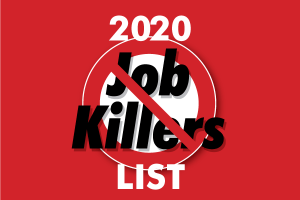 A bill that will limit the financial opportunities for Californians, further harming the housing market and creating job loss is advancing in the Assembly.
A bill that will limit the financial opportunities for Californians, further harming the housing market and creating job loss is advancing in the Assembly.
AB 2501 (Limón; D-Santa Barbara) jeopardizes credit availability for consumer loans in future years by imposing onerous obligations on financial lenders to carry home, mobile home, and auto loans for extended periods of time without receiving payments from borrowers.
Specifically, the bill requires financial institutions to carry homeowner loans for a year or more without payment and without assessing fines or penalties, prohibits repossession of mobile homes or motor vehicles for non-payment and without assessing fines and penalties, and places onerous restrictions on deferred deposit loans.
As the Department of Finance recently noted, “the widespread economic interruption caused by this global pandemic is unprecedented in modern history.” It is important to note that consumers are not the only casualties of this pandemic – with very few exceptions, most industries, and businesses large and small and their employees, have been impacted by this crisis. AB 2501 shifts a significant portion of the costs of this pandemic to the private sector.
The California Chamber of Commerce has repeatedly pointed out that the private sector cannot be the safety net for this crisis. That is the role of government. While it will contribute to the recovery, the private sector cannot absorb the burdens proposed in AB 2501 without it causing further harm, including loss of jobs.
Will Limit Lending, Kill Jobs
AB 2501 requires financial institutions and financial service businesses to essentially carry mortgage and car payments for at least 180 days after the COVID-19 state of emergency ends. The state of emergency, however, could last years. For example, the emergencies declared on November 8, 2018 and October 27, 2019 due to wildfires and extreme weather conditions in Ventura County and other counties remain in effect today, long after the fire season has ended.
Moreover, even when the 180 days expires, AB 2501 still limits the ability for these institutions to recover any loss payments from the consumer.
Requiring these institutions to potentially go years without receiving payment is a significant burden that will negatively impact financial opportunities for Californians. Given the financial risk this proposal creates for such institutions, there is no question that the institutions will limit the mortgage and auto loans it offers. There will likely be stricter criteria to qualify, or, higher rates to offset the potential loss these institutions could suffer under AB 2501.
This limitation will have a negative impact on the housing market, further exacerbating the housing crisis and creating job loss in the housing industry.
It also will unquestionably limit car loans, especially for those with problematic credit history, and will harm both consumers and workers in the auto industry.
Financial Institutions Already Assisting Consumers
AB 2501 is largely unnecessary. California and the federal government already heavily regulate lenders in the sectors covered by the bill, and each must meet scrutiny regarding their lending practices and asset management.
The CalChamber points out that financial lending industries targeted in the bill gain no benefit from not working with customers who have been financially impacted by the economic fallout of COVID-19. Most have already taken steps to work with customers to tailor forbearance and other programs that meet each customer’s individual, demonstrated needs. Mortgage and auto finance lenders gain no benefit in repossessing cars and homes with no market for resale. Deferred deposit lenders hold no collateral and derive no benefit from taking draconian measures that ensure they will never be repaid from borrowers.
At a time when consumers need more financial options, not fewer, AB 2501 will limit those opportunities and further harm the state’s economic recovery.
The CalChamber continues to urge lawmakers to oppose AB 2501 as a job killer.
Staff Contact: Valerie Nera


